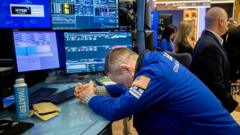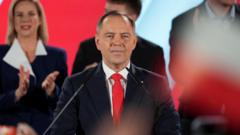Mixed signals from President Trump keep the market volatile as analysts warn of potential global repercussions.
US Markets Experience Turbulent Trading Amid Tariff Tensions

US Markets Experience Turbulent Trading Amid Tariff Tensions
Investors remain anxious as trade war fears loom large over the US economy.
The US stock market saw dramatic fluctuations on Monday, with shares recovering some ground amid ongoing concerns over President Donald Trump's escalating tariff threats. The S&P 500 index, which measures the performance of 500 major US firms, closed the day down by approximately 0.2%, following one of its most erratic trading sessions since the start of the Covid-19 pandemic. Share values fluctuated wildly as investors balanced optimism over potential trade negotiations with the reality of harsher tariffs.
Despite his threats of permanent tariffs, Trump indicated that negotiations might lie ahead, mentioning the potential for some tariffs to be negotiated while reaffirming his stance on others. He dismissed suggestions to delay the implementation of recently announced import taxes targeting all countries. The White House is reportedly in discussions with over 50 nations on trade matters, and EU officials express hope for eventual negotiations.
The fallout from Trump's tariff announcements led to significant market declines, with US and UK exchanges registering their steepest one-day losses since the Covid-19 pandemic began. Over the course of just three days, the S&P 500 saw its value diminish by over 10%, a drop reminiscent of the 2008 financial crisis. Current trading levels are similar to those from roughly one year ago, reflecting deep investor concerns regarding the tariffs' impacts on economic growth.
Investor frustration is palpable, with prominent figures like Jamie Dimon and Bill Ackman voicing their unease about the chaotic situation. Meanwhile, Trump's firm approach resulted in a new threat: imposing an additional 50% tariff on Chinese imports unless Beijing retracts its retaliatory measures. This compounded previous tariffs, potentially raising the total tax on imports from China to an astonishing 104%.
The risks of a full-scale trade war between the US and China continue to rise, drawing worrisome forecasts from market analysts. They predict significant corporate profit losses and a potential economic slowdown, raising alarms about an impending recession.
Intriguingly, a rumor about the White House contemplating a pause on tariffs briefly sent the S&P 500 soaring—an increase exceeding 7% within minutes—underscoring the profound uncertainty shaping market dynamics.
Howard Silverblatt, an analyst with S&P Dow Jones Indices, noted the unprecedented volatility observed during his extensive career, emphasizing the detrimental effects of uncertainty on investment strategies.
Alongside fluctuations in equity markets, European stock indices plummeted, with London's FTSE 100 suffering a 4.4% decline and ending at its lowest point in over a year. Asian markets also reported steep losses earlier in the day, prompting widespread concern. Oil prices dropped over 4% before partially recovering, while copper and gold saw downward movements, reflecting investor apprehension regarding economic stability and growth prospects in the face of escalating trade tensions.
Despite his threats of permanent tariffs, Trump indicated that negotiations might lie ahead, mentioning the potential for some tariffs to be negotiated while reaffirming his stance on others. He dismissed suggestions to delay the implementation of recently announced import taxes targeting all countries. The White House is reportedly in discussions with over 50 nations on trade matters, and EU officials express hope for eventual negotiations.
The fallout from Trump's tariff announcements led to significant market declines, with US and UK exchanges registering their steepest one-day losses since the Covid-19 pandemic began. Over the course of just three days, the S&P 500 saw its value diminish by over 10%, a drop reminiscent of the 2008 financial crisis. Current trading levels are similar to those from roughly one year ago, reflecting deep investor concerns regarding the tariffs' impacts on economic growth.
Investor frustration is palpable, with prominent figures like Jamie Dimon and Bill Ackman voicing their unease about the chaotic situation. Meanwhile, Trump's firm approach resulted in a new threat: imposing an additional 50% tariff on Chinese imports unless Beijing retracts its retaliatory measures. This compounded previous tariffs, potentially raising the total tax on imports from China to an astonishing 104%.
The risks of a full-scale trade war between the US and China continue to rise, drawing worrisome forecasts from market analysts. They predict significant corporate profit losses and a potential economic slowdown, raising alarms about an impending recession.
Intriguingly, a rumor about the White House contemplating a pause on tariffs briefly sent the S&P 500 soaring—an increase exceeding 7% within minutes—underscoring the profound uncertainty shaping market dynamics.
Howard Silverblatt, an analyst with S&P Dow Jones Indices, noted the unprecedented volatility observed during his extensive career, emphasizing the detrimental effects of uncertainty on investment strategies.
Alongside fluctuations in equity markets, European stock indices plummeted, with London's FTSE 100 suffering a 4.4% decline and ending at its lowest point in over a year. Asian markets also reported steep losses earlier in the day, prompting widespread concern. Oil prices dropped over 4% before partially recovering, while copper and gold saw downward movements, reflecting investor apprehension regarding economic stability and growth prospects in the face of escalating trade tensions.




















